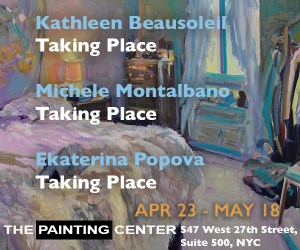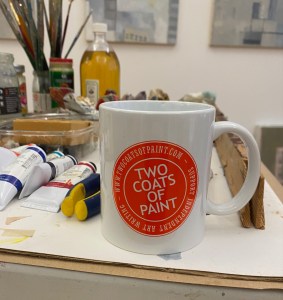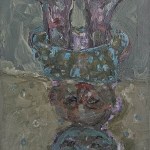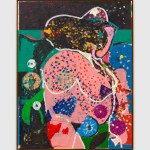 This week Ara Tucker, a graduate of Princeton University�s Art History and Visual Arts program and an alumna of the Bread Loaf Writers� Conference contributes �Brooklyn Bento Box,� a story about an artist preparing for an upcoming collaborative exhibition with her precocious adopted daughter Vabeh, a “a plucky bi-racial orphan� whose work is already being collected by the parents of her private school pals. As she prepares for a mother-daughter photo shoot, the artist begins to worry about her family, neighborhood gentrification, and critics who may like the off-canvas tableau of mother-daughter creativity more than her new paintings. (Images: Ara Tucker and Hilary Harkness)
This week Ara Tucker, a graduate of Princeton University�s Art History and Visual Arts program and an alumna of the Bread Loaf Writers� Conference contributes �Brooklyn Bento Box,� a story about an artist preparing for an upcoming collaborative exhibition with her precocious adopted daughter Vabeh, a “a plucky bi-racial orphan� whose work is already being collected by the parents of her private school pals. As she prepares for a mother-daughter photo shoot, the artist begins to worry about her family, neighborhood gentrification, and critics who may like the off-canvas tableau of mother-daughter creativity more than her new paintings. (Images: Ara Tucker and Hilary Harkness)
Brooklyn Bento Box
by Ara Tucker
Devon looked around the studio. Everything was as she’d left it the night before, right down to the tomato dimpled with rot perched on her drafting table between an X-Acto knife and a cat toy she�d been meaning to refill with catnip. Everything was as she’d left it, but something felt off.
The last time something felt off, ants marching in single file formation betrayed the cat�s leftovers hiding spot. Devon, content to leave the pest control to the kindly but apparently ineffective exterminator, watched the ants as they streamed in through a previously undiscovered hole in the window screen and across the floor to the space between her flat file and the wall. The ants returned the way they came, carrying out flecks of rotting chicken as a lone housefly buzzed overhead like a traffic copter.
Devon sniffed. No foul fowl odor this time. If not the cat�s leftovers, then what? Devon didn�t have time to investigate; especially if she was going to finish Brooklyn Bento Box by the time Vabeh got home from school so that the guy the gallery insisted on sending had time to photograph both of them with their paintings for the catalog that would memorialize their first joint show.
Devon went to her easel and ran her finger over the hen of the woods mushroom she’d painted in the lower right hand corner over the abstracted cash register to make sure it was drying. It wasn’t.
She’d taken a risk with this piece, moving away from a straightforward and cohesive landscape in favor of pairing items having little to no business being painted together. The suggestion of a cash register played a non sequitur game with the mushroom while a stemless dust mop suspended in space brushed away neon pink broccoli florets and chartreuse corn silk. As she departed from her compositional mooring, Devon stuck to her signature color rule of only using the paint that came out of the unmarked and randomized tubes that her assistant set out at the beginning of each painting to inform the palette.
Her assistant was off to see a fabricator about a new panel. Devon had questions about moving from canvas to wood that her assistant was more than qualified to ask on her behalf. He�d take the rest of the day to spend time doing whatever it was he did when he wasn�t in Devon�s studio. Devon didn�t think to ask and he didn�t have a need to tell. It was one of the things she appreciated about him. Too much in life already felt overexposed without her knowing what sort of kink or lack thereof her assistant needed to get through life.
This would leave Devon and Vabeh to do the photo shoot without the benefit of her assistant�s steadying influence. Devon regretted creating a reason for his absence as she took a step back to examine the painting. She took her glasses off and cocked her head to the left and then the right. Then she stepped as close as she could get without her nose bumping the surface. She squinted and stepped back just enough to get her glasses back on without injury to the painting. She stared at the lower right hand corner for a moment. Too many streaks of linseed oil where she�d started experimenting with shine coat. Thankfully the only thing they marred was her signature. She took her glasses off and set them down on ledge of her easel.
Streaks aside, she hated the painting and she loved the painting.
Whether it was his trust fund or a moderate streak of sociopathy, her assistant offered his actual opinions when asked, no matter the potential cost to Devon�s ego. Tomorrow, when he was back in the studio, he would tell her which sentiment was misguided. For now, she had to get back to work on the final touches, flourishes as Vabeh liked to call them.
As instructed, Devon kept her eyes off of Vabeh’s top secret final contribution to their collaboration, which would consist of three paintings by each of them. All Devon knew was Vabeh�s �show stopper� involved the cat, an excessive amount of paper towels, and powdered sugar mixed with oil paint.
As Devon cocked her head to the right again, her bangs got hung up on her left eye. They were getting too long. She didn’t have time to blow hair out of her eyes and she didn�t have time to go to the Lower East Side for a haircut. She�d cut her own bangs. After the photo shoot.
Devon walked into the office/kitchenette that was adjacent to her studio, took her already mixed palette out of the freezer and put some cat food in a dish, anticipating her always punctual studio visitor. She walked back to her easel, lifting the palette over her head with each alternating step, the way her personal trainer taught her.

Finally ready to start painting, she turned on a podcast promising insights into the role Italian licorice played in the Japanese fashion industry. Devon wanted to go to Japan someday, but there were countries with produce more aligned to her creative vision that would require exploration first.
Just as she was hitting a rhythm, the cat slunk downstairs for her afternoon feeding, pausing in the doorframe to scowl at Devon before making her way toward her dish. Devon didn�t take it personally. The cat wasn�t at her best in the afternoon. Evenings were when her personality was shown off to its greatest advantage.
The cat�s appearance also served to warn Devon that Vabeh would be home in a few hours followed closely by the gallery�s guy. Devon wasn’t finished with the fennel spraying out of the perfume atomizer. She’d work slower. That usually made things go better and somehow that counted for more than faster. The gallery�s guy would wait.
Devon lost herself in the comfort of painting slowly as though her afternoon deadline had already come and gone. Slow painting was her sweet spot. She excelled at the art of meandering creativity much more than she excelled at tucking Vabeh into bed. It had been six months already and Devon still made the tucks too tight. She knew Vabeh loosened them as soon as she left the room, not wanting to hurt Devon’s feelings.
Vabeh is my daughter. Devon found herself saying this aloud when no one was around to hear her. Six months in and it still felt wrong that she and her wife, who hadn�t given having children a thought, should have profited so mightily from the untimely death of Vabeh�s mothers.
My first mothers, as Vabeh now called them.
Tucking Vabeh in at night, Devon saw a more diffuse side of the little girl with whom she now shared a studio. That little girl, little person really, brought a concentrated determination to the studio that Devon found unsettling. If Devon had been as consciously ambitious as Vabeh was at such a young age, who knew what her career trajectory would have been.
Probably closer to Daria Drakestein’s with her paintings of placentas mounted on muscle cars and that sweaty drive to surpass the heights of whatever summit her fame reached at any given moment. It was no secret that Daria was making moves away from her current gallery; once fashionable but now closer to shabby genteel. Her work�s price point made it attractive to collectors outside of the US; particularly those in the Emirates. She liked to toss that fact around at dinner parties like Devon�s wife�s best friend Jeff liked to toss around the fact that he’d once slept with someone from the Seychelles.
Daria seemed to know that part of playing the game included tossing bits of information around that might lure the right collector into the right kind of conversation. Devon let her art dealer, and the publicist no one was supposed to know she had, do the tossing on her behalf. The whole game confounded her. Her wife less so. Vabeh least of all.
In a call from his car earlier that week, halfway between Park and The Park, Simon, the collector to whom Brooklyn Bento Box was already promised, had confirmed that Vabeh was far and away the Art Star he’d most like to collect if he wasn’t currently focused on the over 20 year-old crowd. Vabeh and his daughter Chloe attended the same private school and at the moment, were best friends. Devon recalled fourth grade and knew this could change at any moment, so she tried not to get too invested in catering to Chloe�s food preferences (anything orange made her break out into hysterics) or overlooking her undesirable habits (burping on command).
Before Vabeh�s arrival, being thrown in with Simon or any collector for that matter beyond an occasional dinner party or gallery opening, was a social mixture Devon would have avoided at all costs. But being a parent, she was finding, meant having to relax some of the rules that applied to her as a painter. And so, it was why she�d answered Simon�s call in the first place even though she was in the midst of a building up a stubborn yellow ochre. He was calling Devon on his way back from a parent-teacher conversation about Chloe’s propensity to put values on everything around her. Apparently the teacher was a “sell,” Vabeh’s monogrammed fur-trimmed pencil case a “buy” and her math homework a “hold.”
He�d shared this information with Devon proudly as if it meant Chloe was on her way to great things, like finding a cure for insomnia or decoding the latest social app�s algorithm. So as not to appear unimpressed or even worse � withholding, Devon had reciprocated by reporting that during Vabeh’s parent-teacher conversation, the teacher reported that Vabeh was a gracious networker who never hesitated to share an art buying tip or a fashion accessory as needed. Devon also confessed to asking the teacher whether there were any accessories in particular that were being shared as she’d noticed Vabeh’s ponytail holders and fake pairs of glasses vanishing at a rapid rate.
Simon had chortled and returned the favor with a hastily thrown together anecdote about Chloe�s surrogate�s clothing tastes that bordered on offensive for reasons Devon couldn�t quite put her finger on. Her studio assistant had cleared his throat and created a noisy diversion that allowed Devon to hang up without appearing rude and sparing Simon the embarrassment he would have felt if he wasn�t insulated by a healthy sense of self and a car outfitted with the latest noise cancelling technology.
Devon remembered this conversation as she continued working and noted that she hadn�t taken the opportunity to ask Simon why he was so bullish on Vabeh�s work. Even without the benefit of the press mentions Vabeh was racking up, Devon could make a pretty good guess. Simon collected based on sparkle and sentimentality. He liked work that was off the charts on sparkle and high on sentimentality. If he could get a steep discount, even better. It was probably the reason that to-date he�d only owned work from Devon’s “Tuscany Period.” Since then, Devon’s work had featured very little sparkle or sentimentality.
But now, as she looked at Brooklyn Bento Box, the piece promised to Simon, she saw it. Sparkle and a dash of sentiment. Something wasn’t off in the studio. Something was off with Devon�s painting. Her life was seeping onto the canvas even more than it had during those heady months in Tuscany with Pim, the ex-lover whose enthusiastic patronage in the early days was still cited as one of the main reasons Devon had any sort of career at all. Things with Pim ended less badly than they could have, but the after-effects served as a cautionary tale. Since Tuscany, and up until now, Devon had steered clear of placing any autobiographical information on her paintings, hoping the brushstrokes would speak for themselves.
Devon considered the reality in which she now found herself with Brooklyn Bento Box. Her on-canvas/off-canvas lives were once again blurring. It was too late to destroy the painting and start over. What had she been thinking, putting domestic objects alongside produce? Would people even see her other two pieces Bitchy Objects and Naval Gazing with Brooklyn Bento Box sucking up all the gossipy oxygen?
After surfacing these initial worries, she allowed herself exactly one more catastrophic thought even though she’d been working with a creativity coach to banish those during studio hours. What if critics liked the off-canvas tableau of mother/daughter creativity more than they liked anything she painted on the canvas?
Devon and her wife had been the only off-canvas narrative for years and it hadn’t distracted from her paintings. This was mainly because Devon�s wife simply wasn’t Devon’s equal when it came to stardom. People were interested in her wife because of Devon, never the other way around. There was a moment, after her wife�s first book and before Vabeh, when things could have changed and her wife could have become greater than just the sum of being part of Devon. People responded to her wife�s stories and not just the ones about being Devon’s art wife. But her wife, with the assurance of someone who made her money and quite a bit of it in the corporate world, had stubbornly ignored all advice for her second novel and wrote only about the topics she cared about. Those topics didn�t include motherhood or her lack of motherhood.
Devon�s publicist, the one no one was supposed to know about, tried to step in to help her wife right the sinking PR ship once her second book floundered. He lined up appearances on the right cable morning shows and podcasts with women who favored heavy plastic framed glasses instead of contacts and had voices professionally stripped of vocal fry. Their questions, designed to elicit more questions gave their viewers and listeners the satisfaction of feeling smarter by the time they were on their second cup of kombucha.
Her wife, with her good looks and flair for provocation, could have turned the tide by going on those shows and answering the questions about why she�d ignored the motherhood topic with questions about how to raise a purpose-driven cat in brownstone Brooklyn and whether that filled the same sensory purpose as raising a child or choosing not to raise a child. But her wife, without much interest in Devon�s input, decided to forgo the media junket and retreated from the warm intensity of the writer�s spotlight into the coolly efficient overheads of her corporate corner office.
Devon�s wife spent more waking hours in that well-appointed, if poorly lit, office than anywhere else. Where Devon�s only company in the studio consisted of the cat, her assistant and now, Vabeh, her wife was surrounded by confidently incompetent strivers, anxious backstabbers and Ryder. Ryder was the only person in the company that her wife deemed worthy of reference by her actual name.
Ryder occupied an equally impressive corner office on the same floor as her wife. From what Devon could put together from the dinner table conversational scraps her wife shared with her about her actual corporate life versus the corporate life she�d written about in her debut novel, Ryder and her wife spent a lot of time together talking about slide decks, value propositions, creative briefs and their respective therapists.
Devon didn’t have a low opinion of Ryder, it was actually quite high. But, Devon didn’t understand why her wife seemed to prefer high-flying corporate life in well-appointed, but still close, quarters with authoritative talkers like Ryder even though it took her away from her writing, which could be done in the quiet sunlit writing den on the top floor of their brownstone.
Devon, who knew better than most about the dangerous romanticizing of creative solitude and self-direction, still felt her wife was better off pursuing writing full-time than going after another fancy corporate title to gain an office on a higher floor with windows that still didn�t open. How much more money did her wife need to make before she felt like it was enough? It wasn�t as though her wife didn�t have stories to tell that people would actually pay to read, especially now with Vabeh making motherhood a fact rather than a question to be avoided.
A few months ago, while her wife was at work and Vabeh was within viewing range on the playground making some sort of after-school fashion trade with Chloe that seemed ill-advised: her seersucker cape for a pair of Chloe�s monogrammed flip-flops, Devon called her wife�s best friend Jeff and asked him why her wife refused to trade on motherhood and write the book that would surely surpass the success of her first while erasing the humiliations of her second, even now when she could lay a legitimate claim.
From his designer armchair in TriBeCa, Jeff diagnosed her wife. Her wife�s mother, he�d explained, had already written the book on mothering. Not literally, but close enough. Her wife had enough fears around falling short of this high maternal bar and if she wrote, she’d lay those fears out on paper for everyone to see. That was just how her writing went, he said. She could not write anything short of a full-truth even if she was very good at lying when she spoke.
Devon knew her wife�s fears of falling short were on par with her refusal to eat celery under any circumstances and decided to leave her wife to her corporate foxhole while looking the other way as the cat took over the writing den.
Vabeh loved celery. Grateful to have a co-conspirator, Devon bought it in bulk and stored it in the studio refrigerator. Vabeh and Devon chomped on it together during breaks when the painting got difficult. Devon allowed herself moments of maternal pride for things she had nothing to do with, including Vabeh’s voracious celery consumption. Her wife allowed herself very little pride, maternal or otherwise. Vabeh went to her wife when permission slips needed signing or homework needed doing. Vabeh saved her need for hugs and tucking in for Devon when her wife was off-stage.

Her wife didn’t seem hurt by this, but Devon wondered if she even noted the differences. There’d been something off about her since Vabeh had arrived that went beyond the seeming giving up on writing. It was something low grade, but noticeably there just like there was something off with Devon that Brooklyn Bento Box would lay bare for the gallery�s foot traffic and then, when the show was over, for anyone Simon chose to allow into Chloe�s playroom, where the painting would hang until Chloe turned 12 and got to choose her own playroom art.
Vabeh, current best friend of Chloe, was giving the art world what it wanted: a plucky bi-racial orphan; her gender non-conforming cat (name: Altonio preferred pronouns: she/her); her fabulous friends. It all added up to a charmed and charming cosmopolitan childhood. There was an airbrushed quality in Vabeh�s life that got ascribed to her paintings as well. What Devon had to offer, produce on the verge of spoilation choking on and around abstracted aspects of their lives, left little to be desired in comparison.
Realizing this, Devon left the painting on her easel and walked out of the studio. Instead of going upstairs to change into her photo shoot leather pants and oversized cashmere sweatshirt, she walked down a flight of stairs and out the door. She had some time, not much. The air felt heavy and crisp at the same time. Vabeh was between flip-flops and sneakers. They’d reached a compromise as the leaves fell. She would wear ankle high leather boots until the snow began to fall. Devon wore bright red rubber studio clogs and men�s pajamas. They were expensive, but they were still pajamas. Thankfully, it was a quiet hour when most people were inside somewhere.
Their leafy street lined with recently renovated brownstones culminated in what the sharky high-end realtors were calling an urban town square. In reality, it was a busy city street with an uncomfortable hodge podge of shops catering to people surviving on payday loans next to shops catering to the victors of all cash bidding wars. You could get your checks cashed and then head next door to buy artisanal olives. Sushi restaurants, the great equalizers, dotted the street and ranged from $ to don’t come inside if you have to ask.
Devon worried about the health of the shops catering to the people who had been here long before Brooklyn was Brooklyn and her wife worried about health of the shops catering to the newer transplants fleeing the restrictions of Manhattan high-rise co-ops to have a chance at distinctive, press-garnering gut renovations of single-family brownstones. Vabeh, who�d lived in Los Angeles before moving to Brooklyn, just wanted to make sure her favorite shop, the one selling old-fashioned nickel candies for a dollar, didn’t go out of business.
For someone who hadn�t grown up with storefronts so close to where she lived, she was oddly attuned to which stores were about to shutter and which stores were about to expand. Her wife had encouraged this interest by getting Vabeh a map of the neighborhood, thinking it would give them something to share like Devon and Vabeh shared painting. At the beginning, it had worked. Every weekend, Vabeh and her wife stood in the writer’s den, where the map hung at Vabeh’s eye level, making notes about the state of things using colored pencils and thumb tacks.
The neighborhood watching got particularly intense once Vabeh learned that her classmate Gus Hempelstein’s mom was consulting on developing sporty spaces beyond The Park, including a chin-up bar slated to go up in the alley between Vabeh’s beloved candy purveyor and a shuttered storefront with a tacked on sign advertising home heating oil. Vabeh worried the chin-up bar might pave the way for health nuts looking to stamp out candy for good to open up shop next door.
Gus had promised her that wasn’t one of the consequences his mom had identified in her proposal. Still, it threw Vabeh into enough of a state of anxiety that her wife allowed Vabeh buy three times her usual candy order the week the chin-up bar was installed. Devon�s publicist helped set up an impromptu paparazzi sighting of Vabeh buying candy while baby dykes and high school basketball players did chin-ups outside.
The following weekend, Vabeh’s classmates and other bold-faced names from playgrounds across the City and some driven in from Connecticut, lined up for candy. The chin-up bar wasn’t as successful. Gus�s mom hadn’t included a press plan for the city to promote the chin-up bar and the local baby dykes and high school basketball players lost interest. To Vabeh’s delight and relief, the chin-up bar went unused and then almost as swiftly as it had been put in, it was replaced with a bench for candy eaters as her beloved shop bought the abandoned building next door and opened up a bar specializing in peanut brittle and dairy-based cocktails.
Devon, frightened by Vabeh’s seeming influence on the chin-up bar’s demise and perhaps indirectly putting up another win for the gentrifiers, wondered how long it would be before the map illustrated a neighborhood completely occupied by the upwardly mobile. When that happened, she’d be ready to think about moving.
Devon had grown up on a leafy street that emptied onto another leafy street onto a cul-de-sac that turned into a park. It was boring and the only paintings Devon made as a teenager reflected this boredom. Lots of treacly watercolor scenes of empty playgrounds and tree houses. And yet, her art dealer had a steady stream of collectors looking for these early works that would blend into their boring existences and powder rooms on streets without sidewalks and neighbors who waved from their SUVs as they climbed their ridiculously long driveways. As the owners of one of Devon’s earliest edition tree house paintings, her wife�s parents were the envy of their gated community in New Jersey.
Devon didn’t wear a watch, but she still had a sense of the day escaping her as the coffee bars, milk bars and juice bars began emptying out with women and a handful of men rushing to yoga, pilates, and the nail salon before heading to the bars that didn’t open until happy hour. The school buses would be next and then Vabeh would be home. On Wednesdays she walked home with her classmate Roberto and his dad.
The gallery�s guy would only wait for so long. Vabeh would need help arranging her painting cape for the photo. Devon would need help with her vibe. They would help each other. Devon kept walking away from the house. She’d walk until she reached the edge of The Park. She still had time, but not much. Vabeh would beat her back home. She had a key. It would have to be okay.
When Devon finally walked back into the studio, it was awash with tissue paper and photographic equipment. Vabeh kneeled at her easel, trying to coax the cat out from under it. Roberto and his dad hung back awkwardly, saying nothing and sharing the only free cushion on the couch that wasn’t overtaken by Vabeh’s cape collection.
Music played on the studio speakers. Devon winced. Too much bass. She’d switch it back to the comforting treble of podcasts in a moment. First, she needed to make sure Brooklyn Bento Box was safe. She didn’t worry about Vabeh so much as the gallery�s guy who grabbed Cat on Cardboard Scratcher, one of the other pieces for the show, for lighting tests without much regard for its fragility.
Devon stood in the doorway figuring out the safest path through the chaos in front of her. She waved weakly at Roberto and his father. Vabeh ran up to her, engulfing her from the waist down in a hug. Vabeh had powdered her nose and it would seem, her hair, for the occasion. Baby powder dust wafted into Devon’s nose. She sneezed as she returned Vabeh’s hug with gentle stroking on the top of her hair.
Vabeh murmured into Devon’s stomach. “Mom, Altonio is shy. She says her food came too soon before the man with the camera. Will Uncle Simon be mad if she doesn’t pose with us?”
Devon was pretty sure Simon didn’t even know Vabeh’s cat paintings were based on a real cat. It wasn’t like him to care about those sorts of details. Simon wanted Brooklyn Bento Box because of what it symbolized. Vabeh and Devon. Period.
Her wife had purposely scheduled a meeting that she wouldn’t be able to get out of so that she didn’t have to witness this pairing that made her walk around like a dog who’d been kicked too many times. Devon had no words to make her wife feel better about this. If Devon started speaking to her on this topic, the writing conversation would follow and she wasn’t sure she could be kind.
“Can we get a shot of the two of you with Brooklyn Bento Box? Then we�ll get you two with the piece by Vabeh.” The gallery�s guy interrupted Devon’s reverie.
She quickly reassured Vabeh that the cat was off the hook and together they made their way to the painting, still drying on the easel.
###
About the author: Ara Tucker�s writerly preoccupations include art, culture, family, identity and what happens when those things collide. When she’s not working, you�ll likely find her discharging her �art wife� duties somewhere in NYC or taking a break on the side of a hiking trail. She’ll be the one dreaming up stories about an ant colony while her wife paints the landscape.
Related posts:
Fiction: The Square Drawing [Laurie Fendrich]
Alice Neel�s granddaughter Elizabeth Neel talks about painting
Art and Film: Amy Jenkins hosts death
















